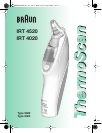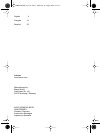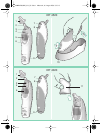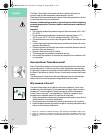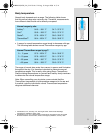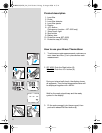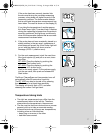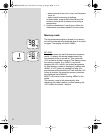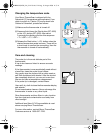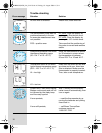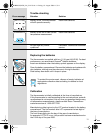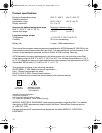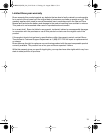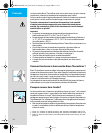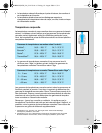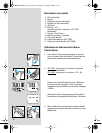
4
The Braun ThermoScan thermometer has been carefully developed for
accurate, safe and fast temperature measurements in the ear.
The shape of the thermometer probe prevents it from being inserted too far into
the ear canal which can hurt the eardrum.
However, as with any thermometer, proper technique is critical to obtaining
accurate temperatures. Therefore, read the use instructions carefully and
thoroughly.
Important
• The operating ambient temperature range for this thermometer is 50–104°F
(10–40°C).
• Do not expose the thermometer to temperature extremes (below –4°F /
–20°C or over 122°F / 50°C) nor excessive humidity (> 95% RH).
• This thermometer must only be used with genuine Braun ThermoScan Lens
Filters.
• To avoid inaccurate measurements always use this thermometer with a new,
clean lens filter attached.
• If the thermometer is accidentally used without a lens filter attached, clean the
lens (see «Care and cleaning»).
• Keep lens filters out of reach of children.
• This thermometer is intended for household use only.
• Use of this thermometer is not intended as a substitute for consultation with
your physician.
How does Braun ThermoScan work?
Braun ThermoScan measures the infrared heat generated by the eardrum and
surrounding tissues. To help to avoid inaccurate temperature measurements,
the probe tip is warmed to a temperature close to that of the human body. When
the Braun ThermoScan is placed in the ear, it continuously monitors the infrared
energy.
The measurement is finished and the result displayed when the thermometer
detects that an accurate temperature measurement has been taken.
Why measure in the ear?
The goal of thermometry is to measure core body temperature
1
which is the
temperature of the vital organs. Ear temperatures accurately reflect core body
temperature
2
, since the eardrum shares blood supply with the temperature
control center in the brain
3
, the hypothalamus. Therefore, changes in body
temperature are reflected sooner in the ear than at other sites.
• Axillary temperatures measure skin temperature and therefore, may not be a
reliable indicator of core body temperature.
• Oral temperatures are influenced by drinking, eating and mouth breathing.
• Rectal temperatures often lag behind changes in core body temperature and
there is a risk of cross-contamination.
1. Guyton A C, Textbook of medical physiology, W.B. Saunders, Philadelphia, 1996, p 919
2. Guyton A C, Textbook of medical physiology, W.B. Saunders, Philadelphia, 1996, p 754-5
3. Netter H F, Atlas of Human Anatomy, Novartis Medical Education, East Hanover, NJ, 1997,
pp 63, 95.
English
IRT4520/4020_NA_S4-42 Seite 4 Freitag, 18. August 2006 11:33 11



